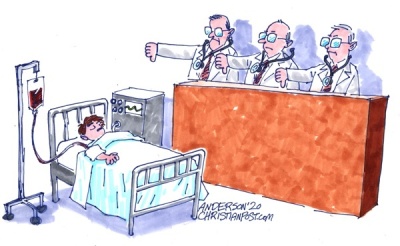Belgium investigating around 10 allegedly illegal euthanasia deaths

Belgian authorities are now investigating approximately 10 allegedly illegal euthanasia-related deaths in Leuven, a city east of Brussels.
In a nation with one of the most permissive legal regimes in the world, officials say they were tipped off by a letter to the De Standaard newspaper, which was penned anonymously, according to BioEdge Sunday.
The letter recounted how a family member who died two years ago was told that it was to be presumed that euthanasia was the cause of death. The doctors that administered the euthanasia did not inform the family, an experience the family described as "traumatic."
Informing the family if someone wishes to be euthanized is not legally required in Belgium but some medical groups recommend it.
The two doctors who were named in the letter are associated with nursing homes in the Emmaus group — a movement that was founded in 1949 by Abbé Pierre (Henri Marie Joseph Grouès), a French Catholic priest, with the goal of helping poor and homeless people and refugees. But the cases being investigated were part of the doctor's private practices, according to Inge Vervotte, head of the Emmaus group. The investigation into these two doctors reportedly began over one year ago.
Wim Distelmans, a professor and the chief euthanasia overseer in Belgium, said that his committee is supposed to be notified about each case of euthanasia that happens in the country but that does not always occur.
“Some doctors are happy to admit that,” Distelmans said.
“What doctors write down, we naturally take for granted as true,” he said.
“Apart from that, and rightly so, everyone is free to file a complaint with the public prosecutor’s office if they think they have reason to.”
Along with its neighbor The Netherlands, the small northwestern European nation has in recent years seen some of the most controversial cases related to euthanasia and doctor-assisted suicide.
In January 2018, the representatives of the Roman Catholic Church warned that the euthanasia law was being abused as patients were being killed without the proper legal checks.
The Health Ministry reported at the time that deaths from euthanasia were increasing by 27% annually. Euthanasia was first legalized in Belgium with considerable restrictions in 2002.
Despite the stated opposition of the Roman Catholic Church to the practice, the 15 psychiatric hospitals run by the Brothers of Charity offered euthanasia at their centers until Pope Francis ordered an end to it when he found out about it in 2017.
The Brothers of Charity subsequently explained that patients who requested to die were granted permission only if they were experiencing "unbearable suffering." The group did not reveal whether euthanasia procedures had been carried out.
In the summer of 2018, it was widely reported that in 2016 and 2017, three children under 18 were put to death by euthanasia in Belgium. In addition to a 17-year-old suffering from muscular dystrophy, a 9-year-old who had a brain tumor and an 11-year-old with cystic fibrosis all died by euthanasia in that two-year period.
"Anyone who is shocked or surprised that the Belgian euthanasia practices have expanded to include children hasn't been paying attention," Stephen Drake, research analyst for Not Dead Yet, a secular national disability rights group that opposes legalization of assisted suicide and euthanasia based on social justice concerns, told The Christian Post in an interview at the time.
"Belgium has been sliding down the slippery slope since the law legalizing euthanasia was passed there. In these particular reports, we really have no idea how 'terminal' these children were — and I doubt that any limitation to 'terminal' will last as a qualifying criterion. There's no requirement for adults be 'terminal' to request euthanasia."



























